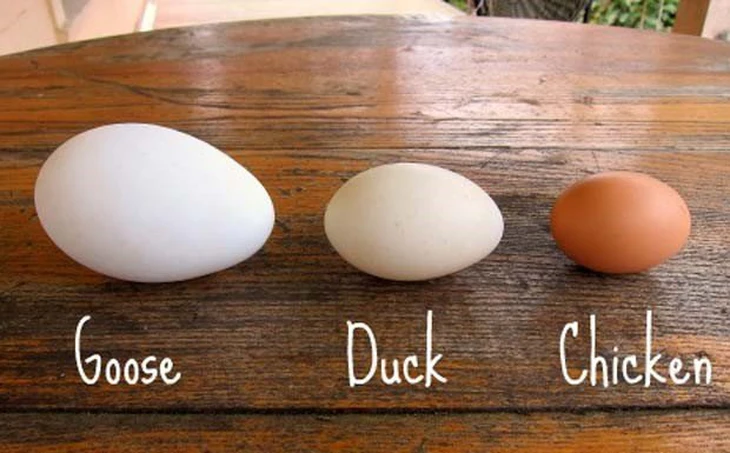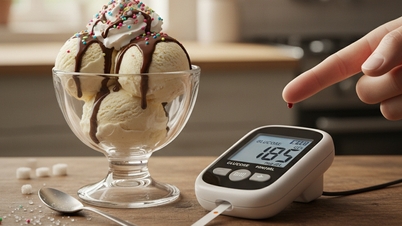
Many people believe that goose eggs are better for pregnant women, however there is no research to show this - Photo: TTO
Are goose eggs more nutritious than chicken eggs?
According to Dr. Nguyen Van Tien, National Institute of Nutrition, goose eggs are also poultry eggs like other eggs, but the weight of a goose egg is about 300 grams - 4 times heavier than a chicken egg and 3 times heavier than a duck egg.
In terms of nutritional value, goose eggs cannot be compared with chicken eggs, nor can goose meat be compared with chicken meat.
In terms of food hygiene and safety, chicken eggs are cleaner than goose eggs because chickens lay eggs in dry places with few bacteria and parasites, so chicken eggs are less susceptible to bacterial and parasitic contamination than goose eggs.
Regarding nutritional value, 100 grams of goose eggs contain about: 13 grams of protein, 14.2 grams of lipid, 360 mcg of vitamin A, 71 mg of calcium; 210 mg of phosphorus; 3.2 mg of iron; 0.15 mg of vitamin B1, 0.3 mg of vitamin B2, 0.1 mg of vitamin PP...
Compared with chicken eggs, goose eggs have a lower protein ratio (the protein ratio in whole chicken eggs is 14.8%) but a higher lipid content (the lipid ratio in chicken eggs is 11.6%).
The vitamin A content in goose eggs is only half that of chicken eggs (360 mcg compared to 700 mcg in chicken eggs), especially vitamin A is very necessary for pregnant women.
Notably, goose eggs are high in cholesterol and lipids, which are substances that are not good for the health and cardiovascular system of pregnant women who are overweight, obese, have lipid disorders, diabetes, high blood pressure, etc.
Each type of food should only be eaten 3 times a week, pregnant women should not overeat goose eggs because they are expensive and difficult to digest. While supplementing with chicken eggs along with a reasonable daily diet also provides enough nutrients for pregnant women.
Many women believe that when pregnant, eating a lot of goose eggs will make the fetus develop healthily and intelligently because they think it will be as big as a goose, which is not true. Currently, there is no research proving that eating goose eggs will make the baby smarter.
"Each food has different nutritional values - no food is complete in all nutrients, so it is necessary to eat a variety of foods in daily meals to supplement each other's nutrients.
In addition, whether a child is smart or not depends on many factors such as the mother's diet, iron/folic acid supplements during pregnancy, genetic factors, living environment and later education ... and not on whether or not they eat a lot of goose eggs," said Dr. Tien.
How to choose good quality eggs
Doctor Tien also guides, to choose good quality eggs, you need to note:
Shine the egg on a light source : Hold the egg in the palm of your hand, only expose both ends, look at one end of the egg, shine the other end on a light source (sunlight or electric light).
Observe the inside of the egg for blood stains, parasites, worms, or any foreign objects. Candid eggs are pink, transparent with a pink dot; the air sac is < 1cm in diameter, with a fixed perimeter.
Drop into 10% salt water solution : When dropped into the solution, if the egg sinks to the bottom, it means that the egg was just laid that day. If the egg floats in the solution, it means that the egg was laid 3-5 days ago. If the egg floats on the surface of the solution, it means that the egg was laid more than 5 days ago.
Egg shaking method : Hold the egg between your index finger and thumb and shake gently. A freshly shaken egg does not make any sound, but the longer you shake the egg, the more it makes sound.
Source: https://tuoitre.vn/trung-ngong-co-that-su-tot-hon-cac-loai-trung-khac-ma-cac-ba-bau-phai-co-tim-mua-20250825154733404.htm


![[Photo] High-ranking delegation of the Russian State Duma visits President Ho Chi Minh's Mausoleum](https://vphoto.vietnam.vn/thumb/1200x675/vietnam/resource/IMAGE/2025/9/28/c6dfd505d79b460a93752e48882e8f7e)


![[Photo] Joy on the new Phong Chau bridge](https://vphoto.vietnam.vn/thumb/1200x675/vietnam/resource/IMAGE/2025/9/28/b00322b29c8043fbb8b6844fdd6c78ea)
![[Photo] The 4th meeting of the Inter-Parliamentary Cooperation Committee between the National Assembly of Vietnam and the State Duma of Russia](https://vphoto.vietnam.vn/thumb/1200x675/vietnam/resource/IMAGE/2025/9/28/9f9e84a38675449aa9c08b391e153183)

























































































Comment (0)